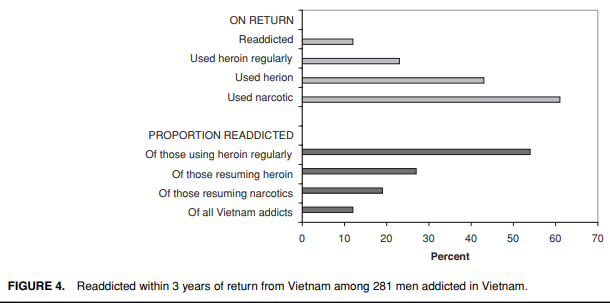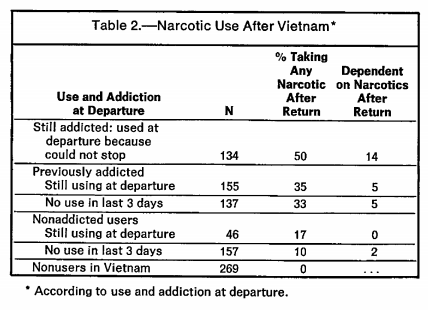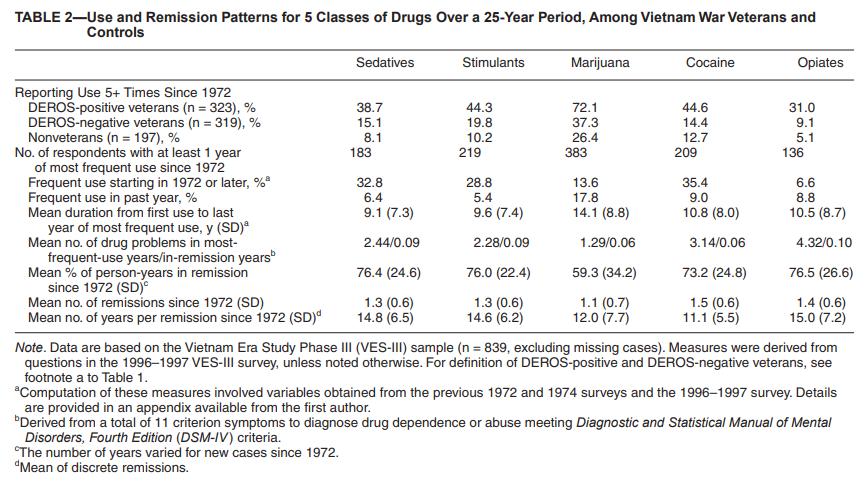The first part of the statement is probably true.
The second part is highly misleading. What the actual paper of the time shows is that 5% of former addicts became re-addicted (basically meaning daily use) in the first year, but the number increased to around 10% in two years, and to 12.5% in three years. Furthermore, if we consider relapse as reuse rather than readdiction, the relapse figure in three years was around 50%; this last figure actually agrees with modern studies of opioid-use relapse.
And as a minor quibble the (1975) Arch. Gen. Psych. study on Vietnam did not separate heroin from other narcotics in terms of reuse/readdiction, although subsequent studies by the same main author (in other venues) did. What I wrote above is based on the follow-up studies.
I don't find the extremely low relapse rate claim plausible. The sources for that from Barry's answer seem to be
- Nixon's drug czar (who obvious has/had a reason to claim addiction is easy to cure); he advanced the exact 5% relapse figure
I believe the number of people who actually relapsed to heroin use in the first year was about 5 percent
- A paper, Robins et al. 2010, originally published in 1977 that was based on army interviews conducted a few years after the veterans returned, which actually says:
It is commonly believed that after recovery from addiction, one must avoid any further contact with heroin. It is
thought that trying heroin even once will rapidly lead to
readdiction. Perhaps an even more surprising finding than
the high proportion of men who recovered from addiction
after Vietnam was the number who went back to heroin
without becoming readdicted. As Fig. 4 shows, half of the
men who had been addicted in Vietnam used heroin on their
return, but only one-eighth became readdicted to heroin.
Even when heroin was used frequently, that is, more than
once a week for a considerable period of time, only a half
of those who used it frequently became readdicted.

So basically the trick here is to claim that using heroin again after being addicted (which happened a lot more that 5%) doesn't count because these guys cannot be considered readdicted. This not the same thing as having quit altogether! So this paper is arguing the semantics of re-addiction basically.
Modern statistics of opioid relapse are on par with that (and in dozens of studies). A Cochrane meta-analysis found that using the standard methadone treatment
the majority of patients relapsed to heroin use.
So either Nixon's drug czar was misquoted/misprinted (is that "5%" missing a zero?) or he confused relapse with this army notion of "re-addiction", but even for that the figure was higher than 5%, actually 12.5% is claimed after 3 years.
Also this paper of Robins does support the 20% "used loads of heroid" if by that you mean they were addicted.
One out of five of our sample reported themselves to
have been addicted to heroin in Vietnam, and that selfdescription
was substantiated by their report of prolonged
heavy use and severe withdrawal symptoms lasting more
than 2 days. Only 1% of our sample reported addiction to
heroin during the first year back from Vietnam, and only
2% reported addiction in the second or third year after
Vietnam.
The rather confusing second part of that statement means that around 5% (1/20) of got readdicted (not merely used again) in the first year... but 10% (2/20) got readdicted in two years. There is a bit of rounding error here compared to the 1/8 claim made more explicitly in the previous quote from the same paper.
Also I think this is the part that the drug czar interpreted as 5% relapsed, meaning "relapsed into addiction" rather than "relapse" in the more usual sense of reusing.
The definition of addiction in this Robins paper was entirely based on the user self-reporting himself as such, but for heroin this coincided (in 80% of the subjects) with daily use; see fig 2 in the paper [omitted here] and commentary on it [likewise].
As an aside, the number of US servicemen using heroin at all (instead of being addicted) was 34% in Vietnam; this from a later (1993) paper of Robins; see fig 1 in that and comments on it. In fact, from the same paper, 38% also used used opium at least once and 45% tried at least one kind of narcotic while over there. (The same paper repeats the 20% figure for addiction, but this time for narcotics instead of just heroin.) Also 80% of Vietnam servicemen used marijuana, according to the same source.
I mention this because the title of the OP's question simply asks about use (unlike the OP's challenged quote which has "loads" as a qualifier.)
And yes, the vague reference to Arch. Gen. Psych. (from the OP quote) almost certainly is the Robins study (which is one and the same, but he wrote about it in multiple venues); the Arch. Gen. Psych. paper is from 1975. The first-year data is more-or-less the same, but this 1975 paper only has data 10 months after the soldiers' return; there's no 2-3 year follow-up like in the 1977 paper. Also this 1975 paper doesn't separate heroin from other narcotics on readdiction/reuse figures:

Men highly dependent on narcotics in Vietnam who said
they had been detected as users at departure because they
were too addicted to quit had a relatively high risk of use
and readdiction after return. But even among these, half
stopped narcotic use entirely on return, and only 14% became readdicted (Table 2). Of course, men had been back
from Vietnam an average of only ten months at interview, and it is possible that increasing numbers of men
will return to narcotic use as time goes on. This seems unlikely, however, since resumption of narcotics generally
began within the first four months after return with the
median date between the second and third month. Furthermore, of all the men who had used narcotics after return, 84% found a source of supply within eight weeks after return, and men living in all geographical locations in
the United States reported ready availability of narcotics.
(In the narcotic category this 1975 study included: codeine, cough syrup, opium, heroine, morphine, and meperidine.)
Its finding ultimately is
After return, usage and addiction essentially decreased to pre-Vietnam levels.
The conclusion from this was elaborated a bit more in the 1993 paper by Robins:
We found little to justify the view of heroin as an especially dangerous drug. [...] Vulnerability to re-addiction if re-exposed may indeed be biological.
There's also a 25-years-later follow-up study on (mostly) the same sample by another research group. This is actually a very complex study to summarize, because it used much more complicated measures (over time); but it's open access, so you can read it yourselves.
A qualitative conclusion drawn by this latter study is that people who were previously frequent users to opiates had a pretty negative memory of that experience, and subsequently avoided this class of drugs; there were more new cases of frequent use of opiates among veterans (and controls) who didn't have such a prior experience (with opiates) in Vietnam. This is corroborated by the number unpleasant/negative symptoms reported by (former) frequent user of opiates, in contrast to the other drugs considered, like cocaine, or other stimulants, or even other sedatives. Vietnam-era users (of any drug) were much more likely to start frequently using (again) these other non-opiate classes than Vietnam-era drug non-users. So there does seem to be a kind of substitution effect away from opiates. As a teaser, here's the main findings table from this paper, but I won't try to explain all the measures here; it takes pages to do that:

This follow-up study also found that quitting cold turkey any class of drugs worked with high probability (around 90%) among Vietnam-era veterans, according to self-reports.
Also there's another paper by the same authors (Price et al.), which found that a lot more of those Vietnam-era drug users had died by the 25-year follow up, more than the Vietnam drug-nonusers or controls (17.4% vs. 7.4% vs 2.8%). The guys who died were not included in the previously mentioned study on taking up drugs again since it was a retrospective rather than really longitudinal study, so we don't know if the dead took up drugs again (and which) or not.



